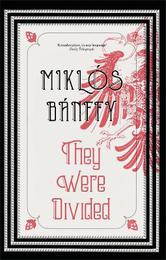
|
They Were Divided
Paperback / softback
Main Details
| Title |
They Were Divided
|
| Authors and Contributors |
By (author) Miklos Banffy
|
|
Translated by Kathy Banffy-Jelen
|
|
Translated by Patrick Thursfield
|
| Physical Properties |
| Format:Paperback / softback | | Pages:368 | | Dimensions(mm): Height 194,Width 126 |
|
| Category/Genre | Modern and contemporary fiction (post c 1945) |
|---|
| ISBN/Barcode |
9781910050927
|
| Classifications | Dewey:894.511332 |
|---|
| Audience | |
|---|
|
Publishing Details |
| Publisher |
Quercus Publishing
|
| Imprint |
Arcadia Books
|
| Publication Date |
8 September 2016 |
| Publication Country |
United Kingdom
|
Description
"Perfect late night reading" JAN MORRIS "Banffy is a born storyteller" PATRICK LEIGH FERMOR "Totally absorbing" MARTHA KEARNEY "So evocative" SIMON JENKINS The final volume of Miklos Banffy's panoramic trilogy of the dying years of the Habsburg empire. They Were Divided reflects the rapidly disintegrating course of events in Central Europe. In the foreground once again the lives of Balint, with his ultimately unhappy love for Adrienne, and his fatally flawed cousin, Laszlo Gyeroffy, who dies in poverty and neglect, are told with humour and a bitter-sweet nostalgia for a paradise lost through folly. The sinister and fast moving events in Montenegro, the Balkan wars, the apparent encirclement of Germany and Austria-Hungary by Britain, France and Russia, and finally the assassination of Franz Ferdinand all lead inexorably to the youth of Hungary marching off to their death and the dismemberment of their once great country. Volume three of the epic, sweeping and wholly immersive trilogy that began with They Were Counted, and continued with They Were Found Wanting. Translated from the Hungarian by Patrick Thursfield and Katalin Banffy-Jelen With a Foreword by Patrick Leigh-Fermor WINNER OF THE WEIDENFELD TRANSLATION PRIZE
Author Biography
Count Miklos Banffy (1873-1950) was variously a diplomat, MP and foreign minister in 1921-22 when he signed the peace treaty with the United State and obtained Hungary's admission to the League of Nations. He was responsible for organising the last Habsburg coronation, that of King Karl in 1916. His famous "The Writing on the Wall" trilogy was first published in Budapest in the 1930s, and rediscovered for the international market after the fall of communism. This epic work has now been translated into ten languages.
ReviewsA Tolstoyan portrait of the end days of the Austro-Hungarian empire . . . compulsively readable. * Guardian * A masterpiece, in any language. * Daily Telegraph * Full of arresting descriptions, beautiful evocations of scenery and wise political and moral insights. * Spectator * So enjoyable, so irresistible, it is the author's keen political intelligence and refusal to indulge in self-deception which give it an unusual distinction. It's a novel that, read at the gallop for sheer enjoyment, is likely carry to along. But many will want to return to it for a second, slower reading, to savour its subleties and relish the author's intelligence. -- Allan Massie * Scotsman * Just about as good as any fiction I have ever read, like Anna Karenina and War and Peace rolled into one. Love, sex, town, country, money, power, beauty, and the pathos of a society which cannot prevent its own destruction - all are here -- Charles Moore * Daily Telegraph * Fascinating. He writes about his quirky border lairds and squires and the highgt misty forest ridges and valleys of Transylvania with something of the ache that Czeslaw Milosz bring to the contemplation of this lost Eden. -- W. L. Webb * Guardian *
|